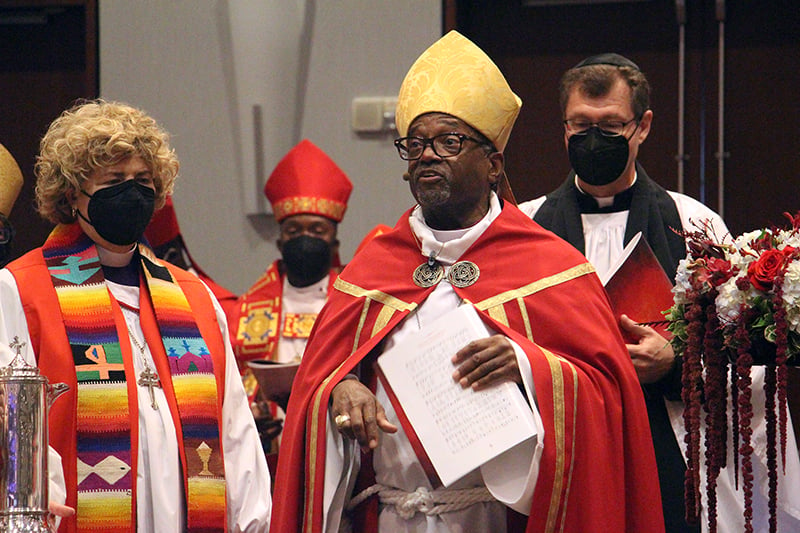
BY : Kathryn Post Religion News Service
The complaint is regarding Curry’s response to abuse allegations against Bishop Prince Singh, the former bishop of the Dioceses of Eastern and Western Michigan. Presiding Bishop Michael Curry during the ordination service of Bishop Paula Clark
Presiding Bishop Michael Curry, head of the Episcopal Church, is the subject of an internal clergy misconduct complaint for his response to abuse allegations against Bishop Prince Singh, the former bishop of the Dioceses of Eastern and Western Michigan.
Singh resigned in September after allegations that he had physically and emotionally abused his ex-wife and sons, Nivedhan and Eklan Singh. His sons originally disclosed their abuse allegations to Curry in December 2022, but a Title IV process — the Episcopal Church’s protocol for responding to accusations of clergy misconduct — was not launched against Singh until the brothers went public with their allegations in June 2023. For months, the family has called for investigations into Curry and Bishop Todd Ousley, who was the intake officer for Title IV complaints against bishops at the time, saying the two mishandled their allegations by failing to initiate the Title IV process.
“We have been saying the same thing since day one: This has very little to do with a personal conflict between sons and their father, or an ex-wife and ex-husband,” Nivedhan Singh told Religion News Service. “This has always been about holding an institution accountable for a lack of checks and balances.”
A spokesperson for the Episcopal Church confirmed via email that “a Title IV complaint has been received” against Curry and Ousley and that the “Title IV process is at the intake stage.”
Curry, who is in the last year of his nine-year term, has been receiving medical monitoring and treatment for internal bleeding and heart conditions since May 2023. An announcement Thursday (Jan. 11) said he had been released from the hospital after a Jan. 6 surgery for a reoccurrence of a subdural hematoma.
Because she is handling a separate complaint against Prince Singh, Barbara Kempf, the Title IV intake officer for bishops, has recused herself from the Title IV complaint involving Curry and Ousley. She is joined by Bishop Mary Gray-Reeves, who, as vice president of the House of Bishops, was initially tapped to carry out the role of presiding bishop during the Title IV process.
“In light of my current pastoral relationship with Bishop Curry and his family during this challenging time, however, I have concluded that I must disqualify myself from serving as part of the Title IV process addressing allegations against him,” Gray-Reeves wrote in a January 10 email.
Gray-Reeves invited Bishop Herman Hollerith, the retired bishop of Southern Virginia, to be her replacement. But given the camaraderie and close relationships among bishops of the Episcopal Church, the Singhs are also calling for an independent, third-party investigation into Curry and Ousley’s responses.
“I think it’s important that we stop putting bishops in charge of other bishops’ disciplinary action,” said Nivedhan Singh. “You might compare it to police officers investigating other police officers, or students grading their own exams.”
The Title IV process involving Prince Singh, which has been referred for investigation, is ongoing. The Singh brothers and their mother have said Prince Singh physically and verbally abused his sons throughout their childhood, threatened his ex-wife with a knife, threw objects at her and misrepresented facts about his divorce. When Bishop Stephen Lane, provisional bishop of Rochester, New York, received an email with Nivedhan Singh’s disclosure in June 2023, he said it constituted a formal complaint against a bishop and directed it to the Title IV intake officer. The letter Nivedhan Singh sent to Lane, he told RNS, was the same one he sent to Curry the previous December.
“I see that as gross mishandling from the highest level of leadership within a church system, in this case from the presiding bishop himself, who should be well-versed in the practices for Title IV and the canonical requirements for swift action when even a potential Title IV violation is brought about,” said Nivedhan Singh.
RNS photo by Emily McFarlan Miller
















